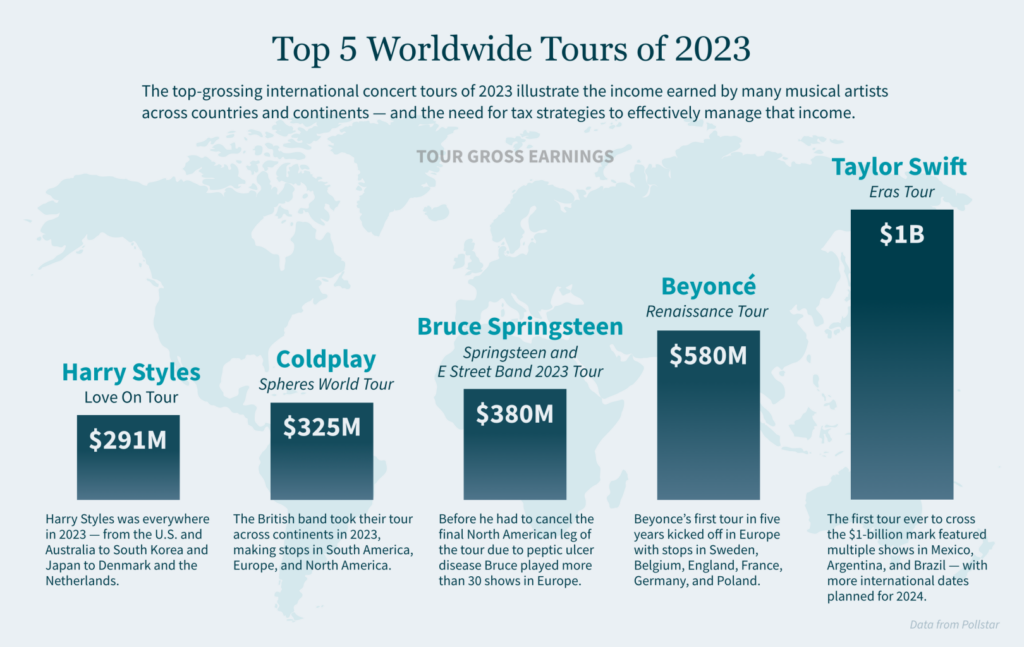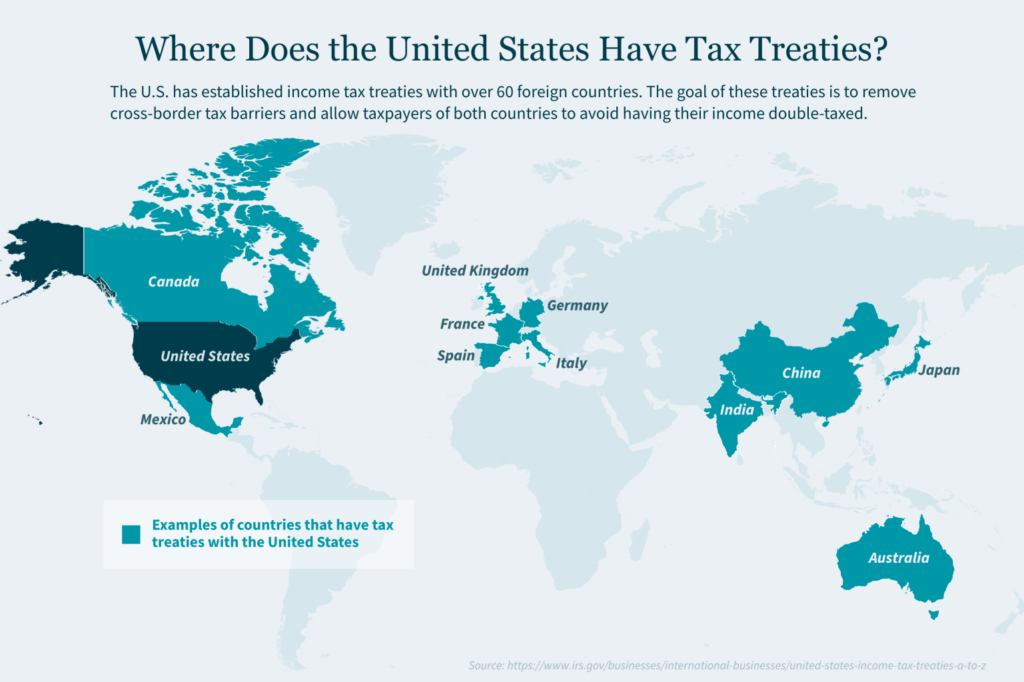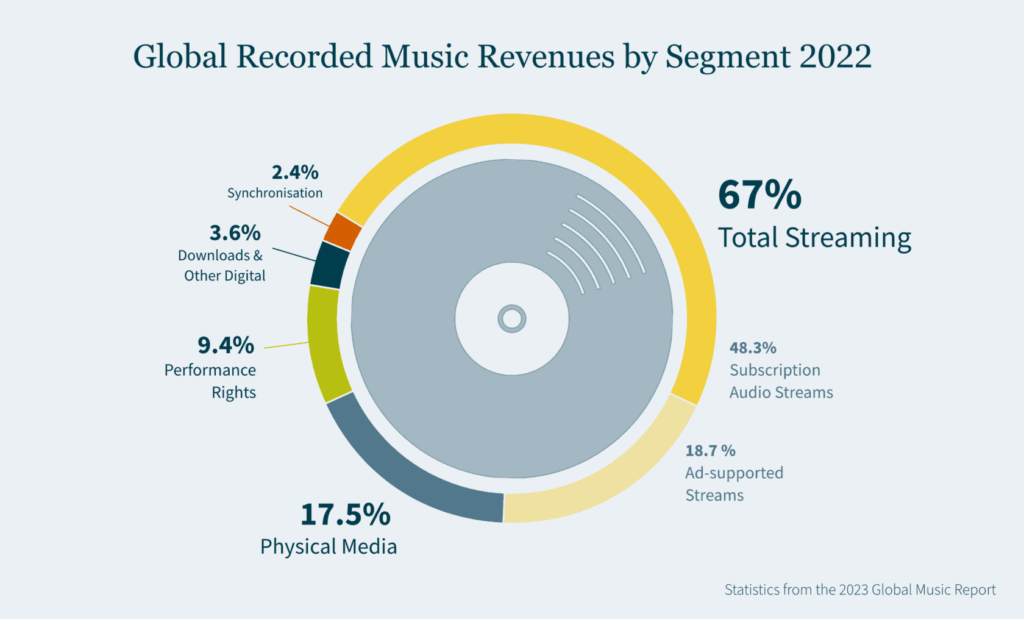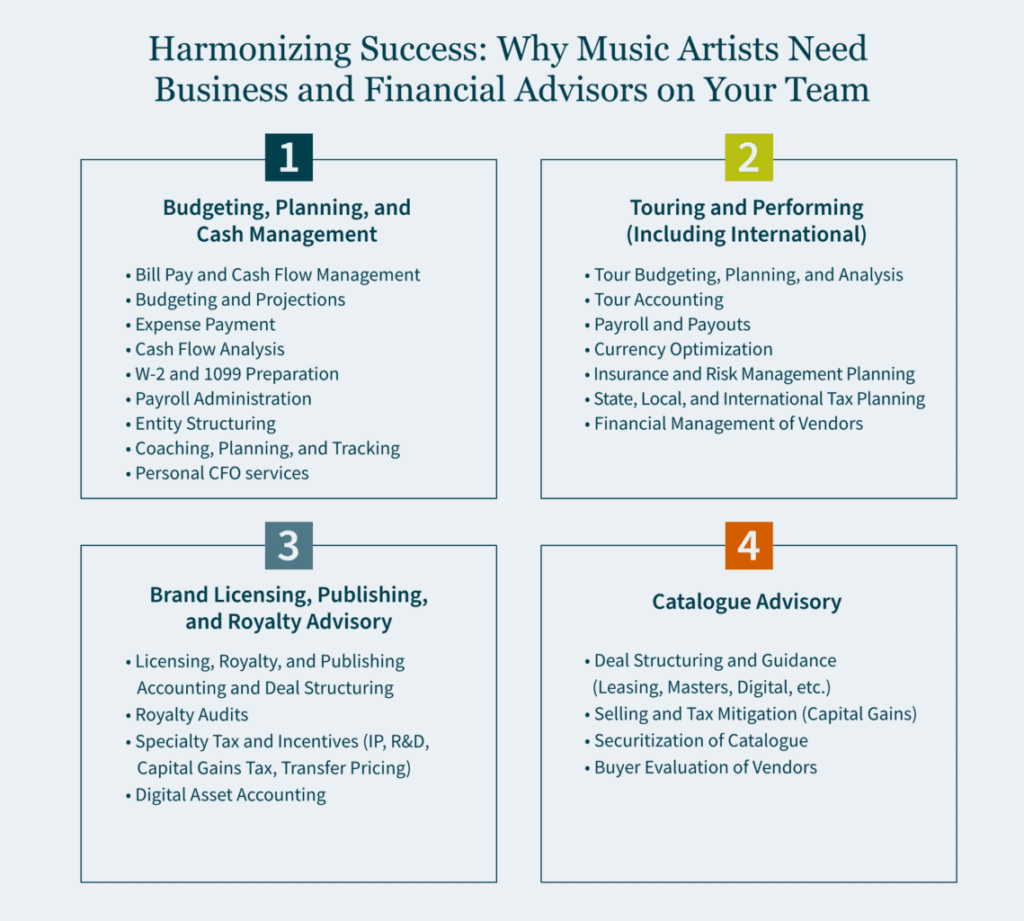Key Takeaways:
- International touring is experiencing a significant resurgence following the challenges of the COVID-19 pandemic, presenting lucrative opportunities for music artists to expand their reach globally.
- However, navigating the financial landscape of international tours involves addressing complex challenges — including understanding tax implications across borders and managing soaring production and travel costs.
- To maximize profitability and minimize financial risks, artists should take strategic steps, such as meticulous tour itinerary planning, thorough contract reviews by financial and legal professionals, and strategic budgeting to optimize expenses.
~
If you’re a music artist, it’s hard to look back on 2023 and not want to head out on tour in 2024. After the COVID-19 pandemic put a serious damper on touring, the concert business has come roaring back to life.
In 2022, the top 100 worldwide tours grossed an (at the time) record-setting $6.28 million. Then along came 2023, which — led by the highest grossing global concert tour of all time, Taylor Swift’s Eras Tour, and Beyoncé’s blockbuster Renaissance World Tour — blew 2022 out of the water, grossing an astronomic $9.17 billion.
With both attendance and average ticket prices up, more artists are seeing the value of touring around the globe. But amidst the excitement for international tours also lies a maze of financial considerations. Understanding and strategizing around these intricacies is essential to maximize your earnings.

Six Strategic Financial Tips to Maximize Your International Tour Profitability
For musicians and managers, it’s crucial to get a handle on all touring costs — factoring in local pricing and taxation — and how they will impact your net earnings.
To increase the likelihood of financial success and minimize surprises, take these steps:
1. Prepare for tax implications across borders
When you embark on an international tour, taxation is not confined to a single jurisdiction. Every country, region, and municipality you visit becomes a potential tax obligation with varying rates, regulations, and exemptions. Many countries also require non-resident entertainers to pay withholding taxes on income earned within their borders.
Furthermore, the existence of income tax treaties between countries adds another layer of complexity. These treaties aim to prevent double taxation and often provide relief for touring artists. However, navigating these treaties requires careful consideration and knowledge in international tax law.
The bottom line: Understand what your tax obligations will look like before you head out on tour.
2. Plan your tour itinerary with local costs in mind
When mapping out your tour, think beyond venues and audiences. Consider both the tax implications and the regional pricing dynamics (production costs, hotels, labor, etc.) of each destination.
You should also map out an efficient tour route that minimizes transportation costs. Lock in inflexible dates like festivals first, then route other dates logically. Avoid crisscrossing to reduce travel, and analyze the various costs of transportation such as renting tour buses compared to repeated flights.
3. Have a financial professional review your contract
While it’s standard to have a lawyer review a contract, you should also have your touring contract reviewed from a financial perspective.
Consult experienced professionals who can arm you with firsthand knowledge of the touring process and insights from countless past negotiations. They can assess whether your rate accounts for all overhead costs like production, transportation, personnel, etc., so you get the monetary return you deserve.
You also want professionals on your side who are familiar with income tax treaties and local regulations to minimize tax liabilities and maximize earnings as you perform in different jurisdictions.

4. Budget to keep your travel costs in check
While international tours can be a major moneymaker, international production and shipping costs have soared. Additionally, travel costs like plane tickets, baggage fees, gas, visas, accommodations, and ground transportation for you and your team can really cut into your profitability.
Jeremy Young, senior director of sales for Cast & Crew Live Entertainment, notes: “We’ve noticed from the payroll coming in from tours of all sizes, that their international tours seem to be shorter than they were prior to COVID. This is most likely attributed to the demand domestically still being very high, along with increasing (international) travel costs and other logistical obstacles created by the pandemic.”
The scale of your show affects staffing needs like dancers, audio/lighting engineers, and security. Hiring multi-disciplined staff who can fulfill several roles can save on flights, hotels, per diems, and salaries. You can also consider hiring local crews in each city (while still accounting for visas/work permits).
The key to managing travel costs is proper planning and budgeting to keep your expenses from exceeding your earnings.
5. Maintain a meticulous record of your expenditures
Touring expenses can add up quickly, but they can also provide valuable tax deductions down the line. From meals to marketing, keep detailed records of all your expenditures — and where you spent them.
Recording expenses in accounting software helps to better track and manage data. Understanding deduction rules in each jurisdiction can help minimize your tax burden.
Insider Tip: The Internal Revenue Service (IRS) recently announced plans to conduct audits on corporate jet usage, particularly focusing on personal use, as part of a broader effort to ensure high-income groups fulfill their tax responsibilities. As you plan your global itinerary, stay informed about potential tax implications related to personal use of corporate jets or similar assets that could impact eligibility for certain business deductions.
6. Be mindful when monetizing your merchandise
Merchandise sales can be a lucrative revenue stream for touring artists — with many artists making a high percentage of their income from merch. But to get the most from your merchandise, you need to think strategically.
Here are a few areas to consider:
- Shipping – The decision whether to ship merchandise ahead of you or have it fulfilled at your destination country depends on several factors — including logistics, costs, fees, convenience, and risk management.
- Pricing – When determining pricing for your merchandise, consider factors such as production costs, shipping expenses, and local pricing dynamics. Research pricing trends in each international market and adjust prices accordingly to reflect local demand and purchasing power.
- Taxes – Before selling merchandise in each international destination, familiarize yourself with local regulations and tax laws governing merchandise sales. Different countries may have varying requirements for business permits, sales taxes, and import/export duties.
Orchestrating Your Financial Success
Embarking on a global tour is exciting, but not without its financial challenges.
Consulting with professionals before heading out on your tour can help you avoid potential pitfalls. Appropriate planning, record keeping, and a savvy strategy can minimize taxes and better position you and your team to maximize take-home profit.
At MGO, our International Tax and Entertainment, Sports, and Media (ESM) teams are dedicated to helping artists like you navigate the financial complexities of touring. With our knowledge and guidance, you can harmonize your strategies so your international tour hits all the right notes—both artistically and financially. Reach out to us today to learn more.





